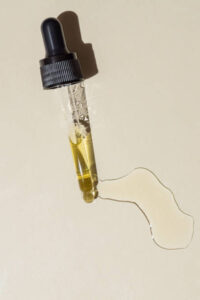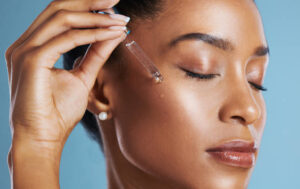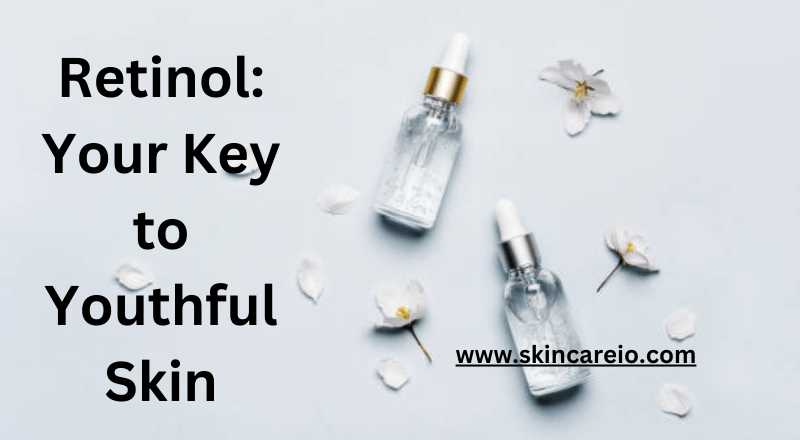Retinol, a form of vitamin A, is a highly regarded skincare ingredient known for its numerous benefits for the skin. It is commonly used to address various skin concerns and is considered an effective anti-aging and skin-renewing compound.

How does Retinol Works:

Retinol works by binding to specific receptors in the skin called retinoid receptors. Once activated, it has several effects on the skin:
Stimulates Collagen Production: Retinol encourages the production of collagen, a structural protein that helps keep the skin firm and youthful. Increased collagen production can lead to smoother and more supple skin.
Cell Turnover: Retinol promotes cell turnover, which means it helps the skin shed dead and damaged skin cells more efficiently. This process reveals newer, healthier skin cells and can improve skin texture.
Unclogs Pores: Retinol helps to prevent the buildup of dead skin cells and sebum in pores, making it an effective treatment for acne and preventing blackheads and whiteheads.
Reduces Hyperpigmentation: Retinol can fade dark spots, sunspots, and post-inflammatory hyperpigmentation (PIH) by inhibiting the production of melanin and promoting even skin tone. Improves Fine Lines and Wrinkles: Retinol is renowned for its anti-aging benefits. It can reduce the appearance of fine lines, wrinkles, and signs of photoaging.
Enhances Skin Hydration: Some retinol formulations include moisturizing ingredients that help the skin retain water, preventing dryness and flakiness. Common Uses of Retinol for Skin:
Read Also: Glycerin’s Health and Beauty Benefits
o Anti-Aging: Retinol is often used in anti-aging skincare routines to minimize the appearance of fine lines, wrinkles, and age spots. It can help maintain a youthful complexion.
o Acne Treatment: Retinol is effective in treating acne by unclogging pores and promoting cell turnover. It can be used to prevent and manage breakouts.
o Hyperpigmentation: Retinol can help fade dark spots, melasma, and other forms of hyperpigmentation, leading to a more even skin tone.
o Texture Improvement: Retinol can improve skin texture, making it smoother and more even. It is used to address rough or uneven skin.
o Prevention of Photodamage: Regular use of retinol can help protect the skin from the harmful effects of UV radiation and prevent premature aging.
o Fine Lines Around the Eyes: Specially formulated eye creams with retinol can target fine lines and wrinkles around the delicate eye area.
Various forms of retinol for skin:
Retinol Creams and Serums: These are perhaps the most common forms of retinol products. They come in different concentrations and are designed for daily use to target a variety of skin concerns, including fine lines, wrinkles, and texture irregularities.
Retinol Oils: Some facial oils contain retinol, offering a hydrating and nourishing way to incorporate retinol into your skincare routine. These can be especially beneficial for individuals with dry or sensitive skin.
Retinol Moisturizers: Moisturizers with retinol combine hydration with the benefits of retinol. They can be a convenient way to use retinol daily without the need for an additional product.
Retinol Eye Creams: These are formulated specifically for the delicate skin around the eyes. They help reduce the appearance of fine lines, wrinkles, and crow’s feet. Retinol Night Creams: Night creams with retinol are designed to be applied before bedtime to take advantage of the skin’s natural regenerative processes during sleep.
Read Also: Niacinamide: The key to healthier skin
Retinol Masks: Some face masks contain retinol to provide a more intensive treatment for skin renewal. These masks are typically used once or twice a week.
Retinol Peels: These are professional-grade treatments typically administered by dermatologists or skincare professionals. They use higher concentrations of retinol for a deeper exfoliation and are effective for addressing more severe skin concerns, such as acne scarring and deep wrinkles.
Retinol Patches and Pads: Retinol patches and pre-soaked pads offer a convenient way to apply retinol to specific areas or as an all-over treatment. They can be used to refresh and brighten the skin throughout the day.
Prescription Retinoids: Some retinoid medications, such as tretinoin (Retin-A) and adapalene (Differin), are available by prescription from a dermatologist. These are stronger and may be recommended for more severe skin concerns.
Over-the-Counter (OTC) Retinol: OTC retinol products are readily available in drugstores and online. They offer a milder form of retinol and are suitable for those who want to incorporate retinol into their skincare routine without a prescription.
Retinol Sunscreens: Some sunscreens combine retinol with sun protection, offering both UV defense and anti-aging benefits. These products can be used during the day to protect the skin from UV damage.
Precautions and Tips for Using Retinol:
Start Slowly: If you’re new to retinol, start with a lower concentration and gradually increase as your skin becomes accustomed to it. This can help minimize potential irritation.
Use Sunscreen: Retinol can increase skin sensitivity to the sun, so it’s essential to wear sunscreen daily to protect your skin from UV damage.
Moisturize: Some people may experience dryness or peeling when using retinol. Applying a moisturizer can help alleviate these side effects.
Consult a Professional: If you have specific skin concerns or if you’re considering using a higher concentration of retinol, consult with a dermatologist or skincare professional for personalized recommendations.
Night-time Use: Retinol is typically applied at night because it can break down when exposed to sunlight. Apply it to clean, dry skin before your moisturizer.
Avoid During Pregnancy: Pregnant or breastfeeding individuals should avoid using retinol, as it may have adverse effects on the developing fetus.
When selecting a retinol product, consider your skin type, concerns, and sensitivity. Start with lower concentrations if you’re new to retinol and gradually increase use as your skin becomes accustomed to it. Always follow the manufacturer’s instructions for the specific product you are using, and be diligent about using sunscreen during the day when using retinol products, as they can increase skin sensitivity to the sun. If you have specific skin concerns or sensitivities, consulting with a dermatologist or skincare professional can provide personalized guidance on incorporating retinol into your skincare regimen.
